- Home
- Patrick O'Brian
The Ionian Mission Page 8
The Ionian Mission Read online
Page 8
'Perhaps your friend was unfortunate in his sea-going acquaintance,' said Stephen, smiling. 'As unfortunate as he was in his reference to the bee and her building, which is surely confessed by all mathematicians to be geometrically perfect, and therefore not susceptible of improvement. But leaving the bee aside, for my part I have sailed with mariners who were not only active in improving the architecture of their machines and the art of conducting them, but who were only too willing to communicate the knowledge they possessed. Such tales have I heard of Captain Bentinck's palls, or rather shrouds, and his triangular courses, of Captain Pakenham's newly-discovered rudder, of Captain Bolton's jury-mast, of improved iron-horses, dogs, dolphins, mouses—or mice as some say—puddings . . .'
'Puddings, my dear sir?' cried Graham.
'Puddings. We trice 'em athwart the starboard gumbrils, when sailing by and large.'
'The starboard gumbrils . . . by and large,' said Graham, and with a passing qualm Stephen recalled that the Professor had an unusually good memory, could quote long passages, naming the volume, chapter and even page from which they came. 'My ignorance is painful to me. As an old experienced seafarer you understand these things, of course.'
Stephen bowed and went on, keeping to slightly safer ground, 'Not to mention the countless devices to measure the speed of the vessel through the water by means of rotating vanes or the pressure of the circumambient ocean—machines as ingenious as the double-bottomed defecator. That reminds me: pray, what qualifications are called for in an Anglican clergyman, what attendance at a seminary, what theological studies?'
'I believe he must have taken his degree at one of the universities, and certainly he must have found a bishop willing to ordain him. My impression is that nothing more is required—no seminary, no theological studies—but I am sure you know more of the Anglican polity than I, since like so many of my countrymen I am a Presbyterian.'
'Not I, since like so many of mine I am a Catholic.'
'Indeed? I had supposed that all officers in the Navy were obliged to forswear the Pope.'
'So they are too, the commissioned officers: but surgeons are appointed by a warrant from the Navy Board. I forswore nothing, which was a comfort to be sure; yet on the other hand without renouncing the Bishop of Rome I can scarcely look forward to being an admiral and hoisting my flag. The height of naval ambition is denied me.'
'I do not understand. Surely a gentleman in the physical line can never hope to be an admiral? But you are pleased to be jocose, I have no doubt.' Jocularity did not please Professor Graham; he looked somewhat offended, as though he had been trifled with, and shortly afterwards he took his leave.
But he was back again the next afternoon, and he and Stephen now gazed upon the Rock at short range, the Worcester having been removed to make room for the Brunswick and Goliath, and Pullings having swung her stern-on so that her starboard side could be scraped and painted. It was one of those days when some particular quality in the light and not merely the brilliance of the sun makes colours glow and sing: a military band was playing on the Alameda, its brasses blazing like gold beneath the shade, while through the gardens and up and down the Grand Parade flowed an easy crowd of red coats, blue jackets, and a wonderful variety of civilian clothes from Europe, Morocco, the Turkish provinces of Africa, Greece and the Levant, and even from much farther east. White turbans and the pale, dust-blue robes of Tangier Copts, the dark red and broad straw hats of Berbers and the black of Barbary Jews moved in and out among the pepper-trees, mingling with tall Moors and Negroes, kilted Greek seamen from the islands, red-capped Catalans, and small Malays in green. On Jumper's Bastion stood a group of the Worcester's young gentlemen, some long and thin, others very small indeed, and Stephen noticed that they seemed to be gathered about a monstrous dog; but as they moved off it became apparent that the creature was a calf, a black bull-calf. Other Worcesters wandered among the geraniums and castor-oil plants: these were the select bands of liberty-men, those who had had the time and the foresight to provide themselves with white or black-varnished low-crowned hats with the ship's name embroidered on the ribbon, watchet-blue jackets with brass buttons, spotless white duck trousers, and little shoes; each had had to pass the master-at-arms' inspection, for although the Worcester was not yet a crack ship or anything remotely like one, Pullings was very jealous of her reputation and he acted on the principle that the appearance of virtue might induce its real presence. Few of them were drunk yet, and most of their mirth—clearly audible at half a mile—was the effect of pure unaided gaiety. Beyond them and the variegated crowd rose the grey and tawny Rock, green only at its lower rim, and above its long crest the strange fog or breeding cloud brought into being by the levanter, a breeding cloud that dissipated there in the blazing light of the western side. Stephen had Mount Misery clear in his telescope, and sharp against the whitish sky an ape: high, high above the ape a vulture hanging on the wind. Both Stephen and the ape gazed at the bird.
Professor Graham cleared his throat. 'Dr Maturin,' he said, 'I have a cousin who occupies a confidential post under Government: he is concerned with the gathering of information more reliable than newspaper or mercantile or even consular reports and he has asked me to look out for gentlemen who might assist him. I know little of these things—they are far outside my province—but it occurs to me that a medical man, fluent in the Mediterranean languages, with a wide acquaintance scattered about these shores, would be unusually well suited for such purposes, above all if he were of the Romish persuasion; for it appears that most of my cousin's colleagues are Protestants, and clearly a Protestant cannot enter into the intimacy of Catholics as well as their co-religionists. Allow me to add, that my cousin disposes of considerable funds.'
The distant ape shook its fist at the vulture: the enormous bird tilted and gliding sideways crossed the strait to Africa without a movement of its wings—a fulvous vulture, Stephen observed with satisfaction as the colour showed upon the turn. 'Why, as for that,' he said, putting down his telescope, 'I am afraid I should make but an indifferent source of information. Even in a small town—and you must have noticed how closely a ship resembles a small crowded town, with its hierarchy, its people all knowing one another, its particular walks and places of refreshment for the different classes, its perpetual gossip—even in a town a medical man rarely gets away. But a ship is a town that carries its walls with it wherever it goes. A naval surgeon is tied to his post, and even when the ship is in port he is still much taken up with his patients and with paper-work, so that he sees little of the country or its inhabitants. Oh, it is the pity of the world to travel so far and to see so little.'
'Yet surely, sir, you do go on to dry land from time to time?'
'Not nearly as often as I could wish, sir. No. I am afraid I should be of little use to your cousin; and then again the necessary dissimulation, the disguise, the lack of candour, I may even say the deceit called for in such an undertaking would be mighty distasteful. But now that I come to think of it, would not a naval chaplain answer your purpose very well? He has far more time to spare on shore. There are our clerical shipmates, as you see, walking about as free as air with others of their kind. There, just by the dragon-tree. No, my dear sir, that is a common plane: to the right of the date-palms—the dragon-tree, for all love.'
Beneath the dragon-tree's green shade paced twelve clergymen, six from the Worcester, six from the garrison, all clean-shaved, discreetly admiring the majestic beards, Arabian, Hebrew and Berber, that passed them on the parade.
'We say farewell to all of them but one,' observed Professor Graham. 'The wardroom will seem strangely bare.'
'Indeed?' said Stephen. 'Five at one blow? I had heard that Mr Simpson and Mr Wells were to leave us, Goliath and Brunswick having arrived, but what is to become of the others, and who is to remain?'
'Mr Martin is to stay.'
'Mr Martin?'
'The one-eyed gentleman. And Mr Powell and Mr Comfrey are to go straight to Malta in tha
t storeship over there.'
'The xebec, or the polacre?'
'The vessel to the right,' said Graham somewhat testily. 'The vessel that is so busy, with sailors creeping up the masts. And Dr Davis has decided to go home, by land as far as ever he can. He finds the sea does not suit his constitution, and is casting about for a suitable conveyance.'
'He is quite right, sure: for a man of his age, and in his state of health, it would be death to be boxed up in a confined moist uneasy tossing habitation, either airless or with so much of it that one's whole person is battered and assailed; to say nothing of the falling damps, so fatal to those that have passed the climacteric. No: to go to sea a man needs youth, an adamantine health, and the digestion of a hyena. But I hope the poor gentleman will be able to attend the farewell dinner? Great preparations are making, I am told. The Captain is coming, and I look forward eagerly to the feast myself; I am sick of eggs and bonny-clabber, and that villain'—nodding in the direction of Killick, who was banging chairs about in the great cabin behind them, before bringing in a host of swabbers to make the place a wet, spotless misery—'will bring me nothing else.'
Dr Davis was not able to attend: he was in a Spanish diligence with eight mules drawing him as fast as they could away from everything connected with the sea. But he sent his excuses, his best compliments, his best thanks, and his best wishes, and they filled his chair with a lean, deserving young master's mate called Honey, Joseph Honey. As the church clocks of Gibraltar struck the hour Captain Aubrey walked into the crowded wardroom full of blue coats, red coats and clerical black. His first lieutenant welcomed him, and proposed a glass of bitters. 'I am afraid our company is not quite complete, sir,' he said; and turning he silently gibbered at the wardroom steward.
'Can it possibly be that the Doctor is late?' asked Jack. But even as he spoke there was a muffled thumping, two or three vile oaths, and Stephen came in on his bandaged feet, his elbows supported by his servant, a quarter-witted but docile and sweet-natured Marine, and Killick. They greeted him, not indeed with a cheer, for the Captain's presence was a restraint upon them, but very cheerfully; and as they sat down Mowett said, smiling across the table at him, 'You are looking wonderfully well, dear Doctor, I am happy to see. But it is not surprising, for
Even calamity, by thought refined,
Inspirits and adorns the thinking mind.'
'Why you should suppose that mine requires any adornment I cannot tell, Mr Mowett,' said Stephen. 'You have been cultivating your genius again, I find.'
'You remember my weakness then, sir?'
'Certainly I do. And to prove it I will repeat certain lines you composed in our first voyage together, our first commission:
'Oh were it mine with sacred Maro's art
To wake to sympathy the feeling heart,
Then might I, with unrivalled strains, deplore
Th'impervious horrors of a leeward shore.'
'Very good—capital—hear him, hear him,' cried several officers, all of whom had experienced the impervious horrors not once but many times.
'That's what I call poetry,' said Captain Aubrey. 'None of your goddam—your blessed maundering about swains and virgins and flowery meads. And since we are on calamities and leeward shores, Mowett, tip us the piece about woe.'
'I don't know that I quite remember it, sir,' said Mowett, blushing now that the whole table was attending to him.
'Oh surely you do. The piece about not whining—plaintless patience, you know: I make my little girls recite it.'
'Well, sir, if you insist,' said Mowett, laying down his soup-spoon. His normally cheerful, good-natured expression changed to a boding, portentous look; he fixed his eyes on the decanter and in a surprisingly loud moo began:
'By woe, the soul to daring action swells;
By woe, in plaintless patience it excels:
From patience, prudent clear experience springs
And traces knowledge through the course of things;
Thence hope is formed, thence fortitude, success,
Renown—whate'er men covet and caress.'
Amid the general applause, and while the soup gave way to an enormous dish of lobsters, Mr Simpson, who sat at Stephen's side, said, 'I had no idea that the gentlemen of the Navy ever wooed the Muse.'
'Had you not? Yet Mr Mowett is exceptional only in the power and range of his talent; and when you join the Goliath you will find the purser, Mr Cole, and one of the lieutenants, Mr Miller, who often contribute verses to the Naval Chronicle, and even to the Gentleman's Magazine. In the Navy, sir, we drink as much of the Castalian spring as comes within our reach.'
They also drank even headier liquors, and although the Worcester's wardroom, being poor, could afford only the fierce local wine known as the blackstrap, there was plenty of it within reach; and this was just as well, because after its spirited beginning the dinner-party came dangerously near the doldrums: those who had not sailed with Captain Aubrey before were somewhat awed by his reputation, to say nothing of his rank, while the presence of so many parsons called for a pretty high degree of decorum from all hands: and even remarks about the Brunswick's old-fashioned way of carrying her mizzentopmast staysail under the maintop were out of place when so many of the company could not tell a staysail from a spanker. The junior officers sat mute, eating steadily; Somers applied himself to the blackstrap, and although he sniffed it scornfully, as one used to decent claret, he drank a great deal; the Marine captain launched into an account of a curious adventure that had befallen him in Port of Spain, but realizing that its scabrous end was utterly unsuitable for this occasion, was obliged to bring it to a pitifully lame and pointless though decent conclusion; Gill, the master, tried hard to overcome his settled melancholy, but he could manage little more than a bright, attentive look, a fixed smile: both Stephen and Professor Graham had retired into private contemplation; and while the company ate their mutton little was to be heard but the sound of their powerful jaws, some well-intentioned, ill-informed remarks on tithes by Captain Aubrey, and a detailed explanation of the working of the double-bottomed defecator at the far end of the table.
But Pullings sent the bottles round with more urgency than before, crying 'Professor Graham, a glass of wine with you, sir—Mr Addison, I drink to your new floating parish.—Mr Wells, I give you joy of the Brunswick in a bumper, sir: bottoms up.' Jack and Mowett seconded him, and by the time the pudding came in the temperature of the gathering had risen to something more nearly what Pullings could have wished.
The pudding was Jack's favourite, a spotted dog, and a spotted dog fit for a line-of-battle ship, carried in by two strong men.
'Bless me,' cried Jack, with a loving look at its glistening, faintly translucent sides, 'a spotted dog!'
'We thought as how you might like one, sir,' said Pullings. 'Allow me to carve you a slice.'
'Do you know, sir,' said Jack to Professor Graham, 'this is the first decent pudding I have had since I left home. By some mischance the suet was neglected to be shipped; and you will agree that a spotted dog or a drowned baby is a hollow mockery, a whited sepulchre, without it is made with suet. There is an art in puddings, to be sure; but what is art without suet?'
'What indeed?' said Graham. 'But there are also puddings in art, I understand—in the art of managing a ship. Only yesterday I learnt, to my surprise, that you trice puddings athwart the starboard gumbrils, when sailing by and large.'
Graham's surprise was nothing to that of the wardroom. 'By and large?' they said. 'Gumbrils? starboard gumbrils?' Jack's spotted dog hung in his gullet for a moment before he understood that someone had been practising upon the Professor's credulity, an ancient naval form of wit, played off many and many a time on newly-joined young gentlemen, on himself long, long ago, and by Pullings and Mowett on Dr Maturin in former years; but never to his knowledge on any man of Graham's eminence. 'Puddings we have, sir,' he said, swallowing his own, 'and plenty of 'em. There is the wreath of yarns tapering towards the ends and graf
ted all over that we clap about the fore and main masts just below the trusses before we go into action, to prevent the yards from falling; then there is the pudding on a boat's stem, to act as a fender; and the puddings we lay round the anchor-rings to stop them chafing. But as for the gumbrils, why, I am afraid someone must have been practising on you. They do not exist.' The words were scarcely out of his mouth before he wished them back: he knew Stephen extremely well, and that detached, dreamy expression could only mean a consciousness of guilt. 'Unless,' he added quickly, 'it is some archaic term. Yes, I rather think . . .'
But it was too late. Captain Harris, the Marine, was already explaining by and large. With a piece of fresh Gibraltar bread and arrows drawn with wine he showed the ship lying as close as possible to the breeze: '. . . and this is sailing by the wind, or as sailors say in their jargon, on a bowline; whereas large is when it blows not indeed quite from behind but say over the quarter, like this.'
'Far enough abaft the beam that the studdingsails will set,' said Whiting.
'So as you see,' continued Harris, 'it is quite impossible to sail both by and large at the same time. It is a contradiction in terms.' The expression pleased him, and he repeated, 'A contradiction in terms.'

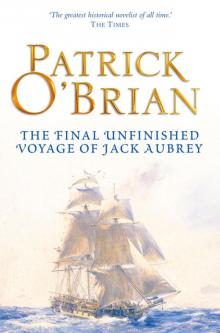 The Final Unfinished Voyage of Jack Aubrey
The Final Unfinished Voyage of Jack Aubrey The Rendezvous and Other Stories
The Rendezvous and Other Stories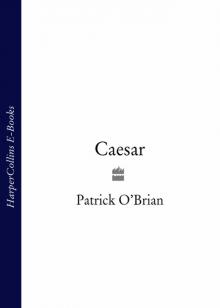 Caesar: The Life Story of a Panda-Leopard
Caesar: The Life Story of a Panda-Leopard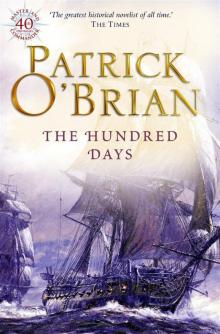 The Hundred Days
The Hundred Days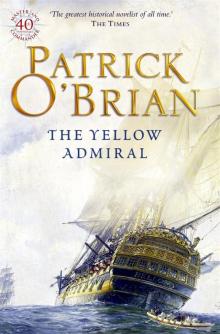 The Yellow Admiral
The Yellow Admiral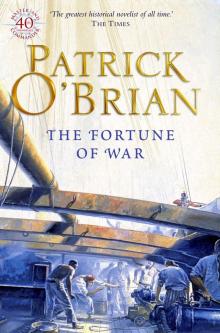 The Fortune of War
The Fortune of War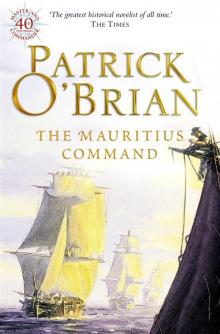 The Mauritius Command
The Mauritius Command Beasts Royal: Twelve Tales of Adventure
Beasts Royal: Twelve Tales of Adventure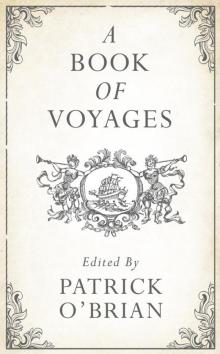 A Book of Voyages
A Book of Voyages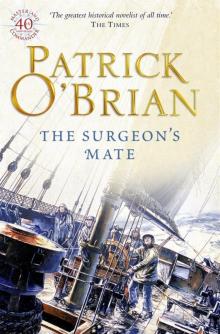 The Surgeon's Mate
The Surgeon's Mate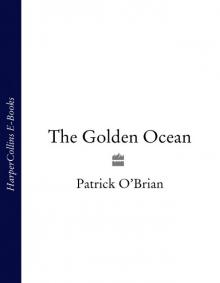 The Golden Ocean
The Golden Ocean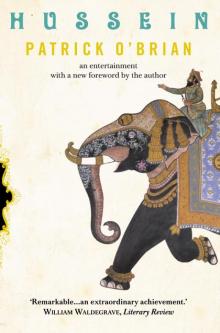 Hussein: An Entertainment
Hussein: An Entertainment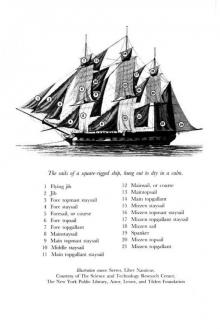 H.M.S. Surprise
H.M.S. Surprise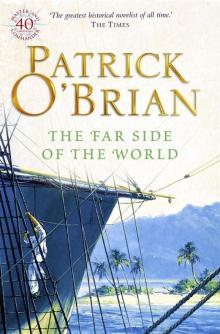 The Far Side of the World
The Far Side of the World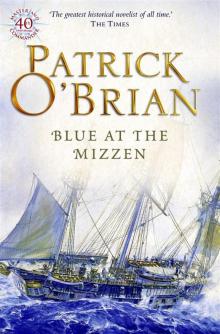 Blue at the Mizzen
Blue at the Mizzen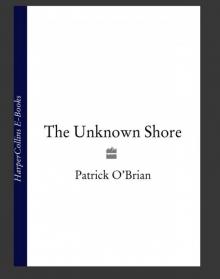 The Unknown Shore
The Unknown Shore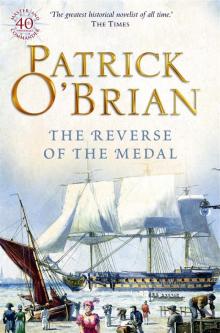 The Reverse of the Medal
The Reverse of the Medal Testimonies
Testimonies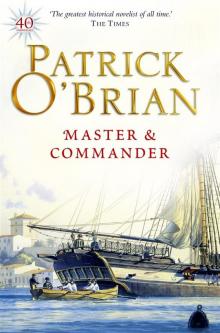 Master and Commander
Master and Commander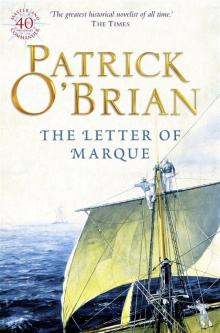 The Letter of Marque
The Letter of Marque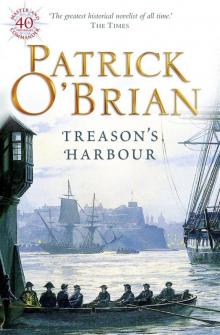 Treason's Harbour
Treason's Harbour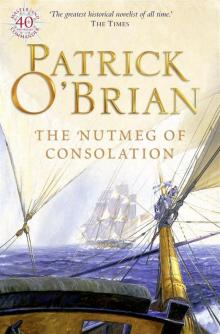 The Nutmeg of Consolation
The Nutmeg of Consolation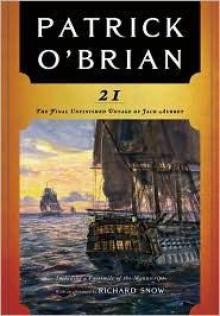 21: The Final Unfinished Voyage of Jack Aubrey
21: The Final Unfinished Voyage of Jack Aubrey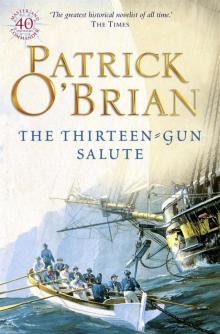 The Thirteen-Gun Salute
The Thirteen-Gun Salute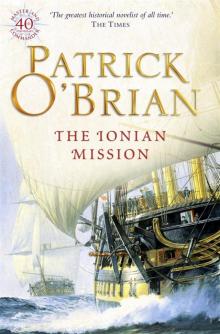 The Ionian Mission
The Ionian Mission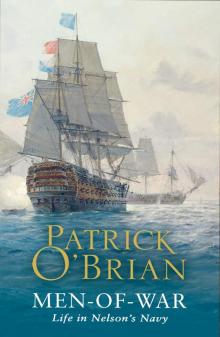 Men-of-War
Men-of-War The Commodore
The Commodore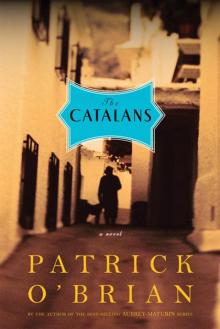 The Catalans
The Catalans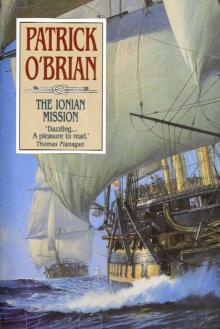 Aub-Mat 08 - The Ionian Mission
Aub-Mat 08 - The Ionian Mission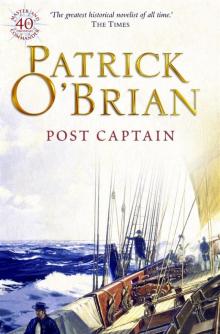 Post Captain
Post Captain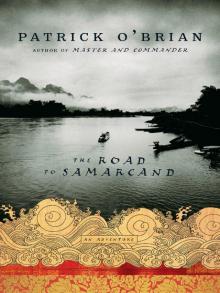 The Road to Samarcand
The Road to Samarcand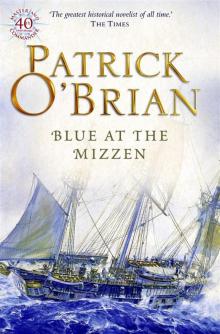 Book 20 - Blue At The Mizzen
Book 20 - Blue At The Mizzen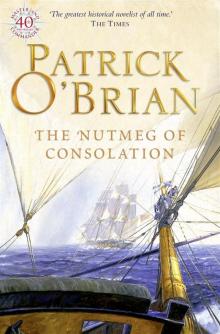 Book 14 - The Nutmeg Of Consolation
Book 14 - The Nutmeg Of Consolation Caesar
Caesar The Wine-Dark Sea
The Wine-Dark Sea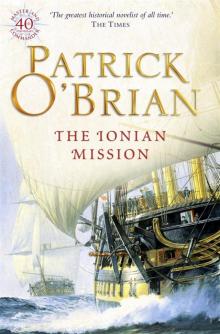 Book 8 - The Ionian Mission
Book 8 - The Ionian Mission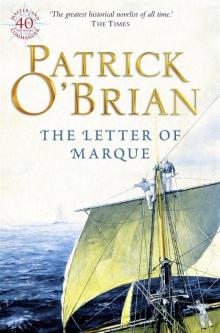 Book 12 - The Letter of Marque
Book 12 - The Letter of Marque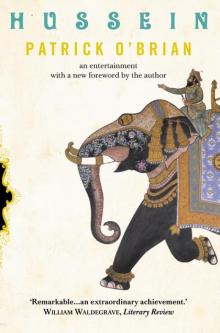 Hussein
Hussein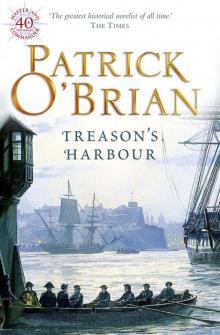 Book 9 - Treason's Harbour
Book 9 - Treason's Harbour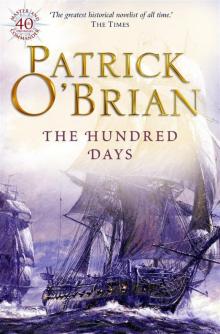 Book 19 - The Hundred Days
Book 19 - The Hundred Days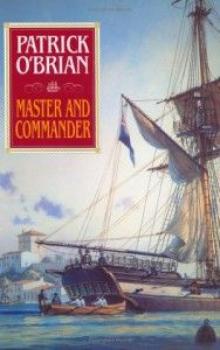 Master & Commander a-1
Master & Commander a-1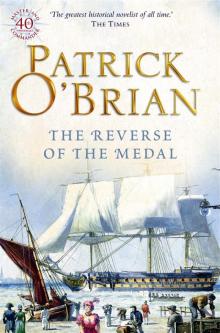 Book 11 - The Reverse Of The Medal
Book 11 - The Reverse Of The Medal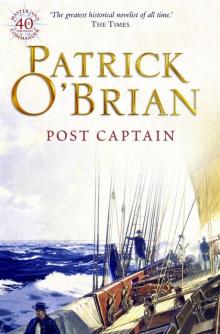 Book 2 - Post Captain
Book 2 - Post Captain The Truelove
The Truelove The Thirteen Gun Salute
The Thirteen Gun Salute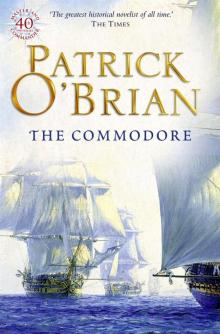 Book 17 - The Commodore
Book 17 - The Commodore The Final, Unfinished Voyage of Jack Aubrey
The Final, Unfinished Voyage of Jack Aubrey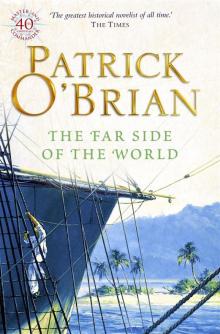 Book 10 - The Far Side Of The World
Book 10 - The Far Side Of The World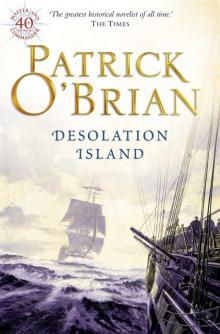 Book 5 - Desolation Island
Book 5 - Desolation Island Beasts Royal
Beasts Royal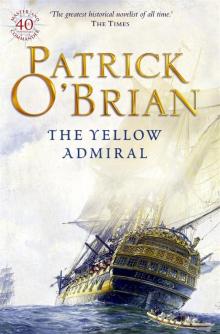 Book 18 - The Yellow Admiral
Book 18 - The Yellow Admiral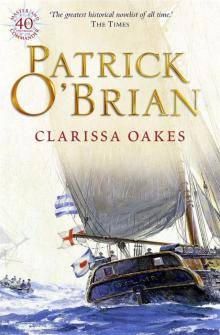 Book 15 - Clarissa Oakes
Book 15 - Clarissa Oakes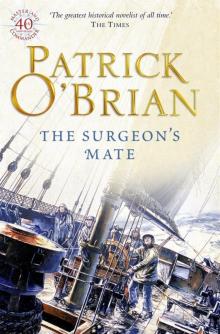 Book 7 - The Surgeon's Mate
Book 7 - The Surgeon's Mate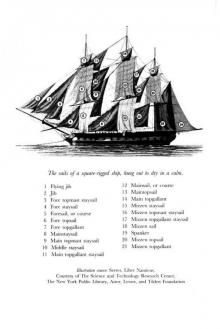 Book 3 - H.M.S. Surprise
Book 3 - H.M.S. Surprise Desolation island
Desolation island Picasso: A Biography
Picasso: A Biography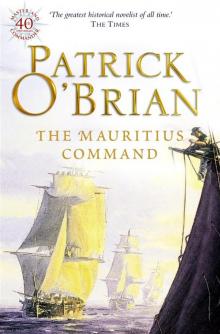 Book 4 - The Mauritius Command
Book 4 - The Mauritius Command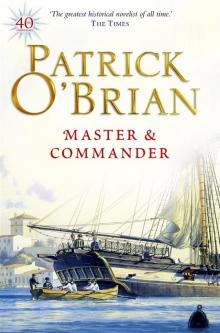 Book 1 - Master & Commander
Book 1 - Master & Commander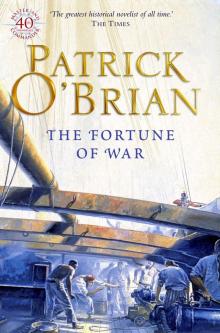 Book 6 - The Fortune Of War
Book 6 - The Fortune Of War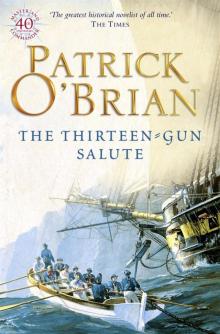 Book 13 - The Thirteen-Gun Salute
Book 13 - The Thirteen-Gun Salute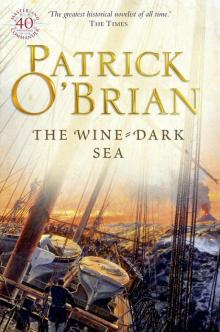 Book 16 - The Wine-Dark Sea
Book 16 - The Wine-Dark Sea